#JinM
Text
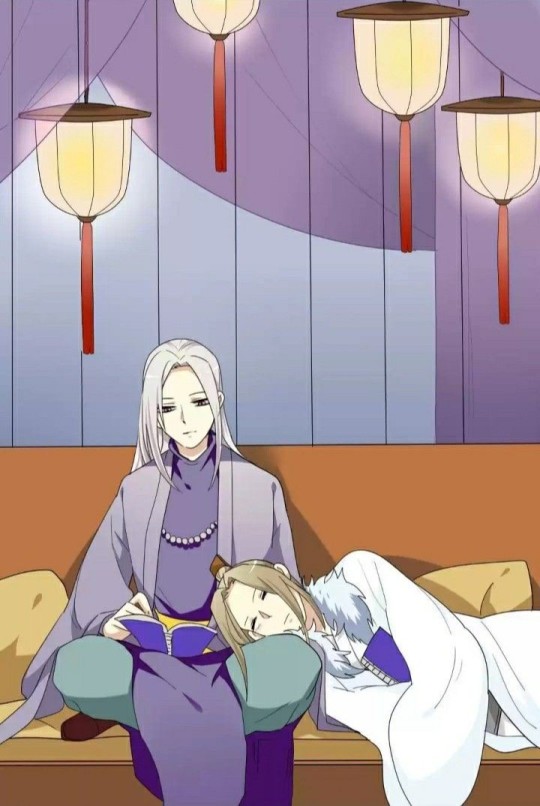

80 notes
·
View notes
Text

They're cute af... just saying
#no doubt in us#luo hanying#xiao jinming#liang bu yi#this will likely be THE most non existant fandom i ever want to join 😂
149 notes
·
View notes
Text
Xu yu and Xiao jinyun are SO t4t idc idc. Absolutely obsessed with them.
#binged 15 episodes of no doubt in us#i am obsessed with them now#also jinming and the astrologist . i love them#no doubt in us
52 notes
·
View notes
Link
Chapters: 1/1
Fandom: Liang Bu Yi (No Doubt In Us)
Rating: General Audiences
Warnings: No Archive Warnings Apply
Relationships: Xu Yu/Xiao Jinyun
Characters: Xu Yu, Xiao Jinyun, Xiao Jinming, Xu Jun
Additional Tags: Alternate Universe - Modern Setting, First Meetings, xu yu centric, Cafes, jinyun is an asshole, Dreams
Summary:
xu yu meets the subject of her dreams
10 notes
·
View notes
Text
Fall into my arms,
'Cause without you I'm falling apart.
guccihighwaters, "dancing with the stars"
7 notes
·
View notes
Text
Literally Fang Leng would've never had a chance if Xiaoqi had seen this. Remember, Xiaoqi is bi, and bisexuals love this kind of thing (women who smash car windows with their high heels)
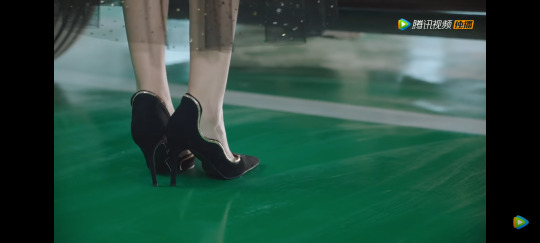
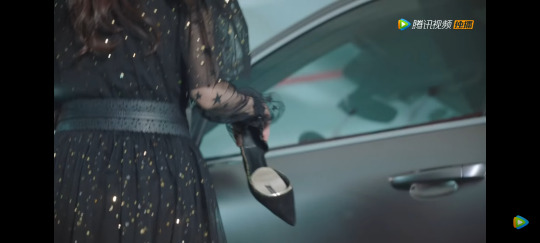








😳😳😳
#which is why i think mr han is bi too#my girlfriend is an alien#c drama#chinese drama#jiang xue#fang leng#han jinming
7 notes
·
View notes
Text
kuch intezar aise hote hain jinme,shaam nahin umr guzar jaati hai.
-unknown
#desiblr#desi academia#desi shit posting#desi stuff#desi rant#rant post#shitpost#kuch toh likhein hai#spilled words#random lines#txt post#txt
157 notes
·
View notes
Text
“Kuch intezaar ese hote hain, jinme shaam nahi, umar guzar jaati hai.”
— Qais Bhat, Laila Majnu (2018)
#laila majnu#desiblr#desi tag#desi#desi tumblr#desi aesthetic#desi romance#love story#bollywood#indian cinema#bollywood movies#tripti dimri#avinash tiwary#laila#qais#heartbreak#romeo juliet
55 notes
·
View notes
Text
69 notes
·
View notes
Text
Main tumhari chitaa par
Tumse milne nahi aaya.
Kyon ki main jaanta hoon
Ki tum mar nahi sakte.
Ye jo rakh hawa mein udd rahi hai,
Wo tum nahi,
Ye jo lakdiyaan sulag rahi hain,
Wo tum nahi.
Jhoota hai woh,
Jisne tumhare marne ki sacchi khabar failaayi hai.
Tum ab bhi wo kursi mein ho
Jo tumhare mez ke saamne padi rehti hai,
Tum ab bhi un kitaabon mein ho,
Jinme maine tumhare liye phool chhipaaye the.
Yeh soch kar ki tum jab bhi un par haath pheroge,
Wo khushboo mujh tak aayegi.
Tum aaj bhi Godavari mein gote lagaa rahe ho,
Aaj bhi purani dilli ki sadkein naap rahe ho,
Tum Adilabaad ke jungle mein, mere saath…
Tum inquilaab ki nas nas mein, watan ke saath…
Wo saal jo tumne naami-badnaami ke zimme guzaare the,
Kahaan hain woh sab abhi,
Wo din jo tumne virah aur ranj mein kaate the,
Kahaan hain woh din sabhi?
Mere seene mein sanjot kar rakhe hain saare,
Kabhi mann kare toh inhe bhi bahaane chale aana.
Tum zinda ho mujh mein,
Chitaa mein main jal raha hoon,
Kabhi fursat mile toh
Isi nadi ke tat par baatein karne chale aana.
20 notes
·
View notes
Text
um so why was xiao jinming holding the paint for luo hanying and why did hanying giggle and put paint on jinming's nose and why did jinming start blushing. explain
76 notes
·
View notes
Text

Vo ankhein jinhone ne khauf ke kya kya manzar nahin dekhey,
Vo ankhein itni mast e raqsaa'ñ ki qalandar nahin dekhey
Vo ankhein jo koi neela samandar nahin,
vo ankhein jinme aj tak basa qalb- e- sikandar nahin,
vo ankhein jinhe halaat ne khul ke chamakne na diya,
vo ankhein jisey kbhi jazbaat mein bhatakney na diya,
vo ankhein jo chashm-e-noor naam ka patthar hi rahin,
vo ankhein jinke Ghar ki azaariyan badtar hi rahin,
Vo ankhein jo apne sabar ka phal paa key thak gayin,
Uthi kisi umeed se to maat kha ke thak gayi,
Vo ankhein cheekhti hai munsifon ki rumani nazmon pe
Kabhi jheel si ,kbhi qayamat ,kbhi Chand ,kabhi sehra
Faqat in deedon ko tumne jhuthla key kya kuch na likh diya
Magar janaan ye do ankhein to bas ankhein hi reh gayi
Jinhone raah e khaar mein ky ghum nahi dekhey
Hairat hai tumne iskey ashq-o- zam nahin dekhey.,
Writer: Alina
#urdu literature#urdu poetry#shayari#urdu stuff#hindi shayari#literature#hindi poetry#desi aesthetic#aesthetic urdu#aesthetic desi#desi tumblr#amir khusro#nusrat fateh ali khan
51 notes
·
View notes
Text
...Like just saying Xu Yu was totally completely sure that Jinyun wasn’t gonna screw while in her body and well duh bc he’d get killed basically no matter what, but ALSO just saying, Jinyun was apparently NOT as sure that Xu Yu wasn’t gonna dip around in some honey just once or twice in his bod and I’m sure there had to be SOME reason for that... XD
ALSO JUST SAYING JINYUN’S LIL BRO JINMING APPARENTLY WISHES THE STAR ASTROLOGER DUDE WAS A CONCUBINE PFFFFFT...
76 notes
·
View notes
Text
Say whatever the fuck you want, the lines kisi zubaan mein bhi vo lafz hi nahi ki jinme tum ho kya tumhe bataa sakoon is the ultimate declaration of love
50 notes
·
View notes
Note
Ek kitaab me aap apni saari shaayriyaan aur nazmein likhke publish kijiye please. Sabse pehle I'll buy it. 🤧🤍🥀
Kya ek kitaab mein qaid karpaunga main
Woh raatein jinme waqt rukjata tha
Woh baatein jo dimag ko sunn kardti thi
Woh saansein ko ruk ruk kr aati thi
Woh barsaatein jo bahot bhigati thi
Qaid toh hum sirf shabdon ko karskte hain
Kisi kitab mein kisi taperecorder mein
Yaafir kisi video mein
Yeh kaafi hain kya koi woh sab wapas jeele agar kaafi hain toh ek kahani likhun
Aur woh kahani shuru ho tumse
Main dekhun yeh waqt guzarta
Tum baithe Milo kahin gum se
Guzarta waqt wahin tham jaye
Fir tumhe woh kahani sunane ki baari aaye...
Dur dur tk Ghana andera
Raat hi raat naa kahin savera
Ik panchi ko yaad main karta
Bin Mausam barsaat main karta
Aakhein lal aur woh bhi itni
Jaise phool gulab
Saansein aate aate ukhaden Marne ko betaab
*ting* *tong*
*Ting* *tong*
Kholo bhyi
*knock* *knock* *knock*
*Nishant*
- Haan aarha
(opens the door)
- Haan bol
✓ chal chalrhe
- kahan
✓ banaras
- Pagal hai kya
✓ haan packing kar, Uncle ko call karke bolde, main baat karlun?
- Nhi nhi main karlunga
✓ Fir jaldi packaging kar
| BANARAS | KASHI | Varanasi |
Okay thagya main...
(thank you so much itne bade compliment ke liye)
🙇🏻♂️✨🤲🏻
14 notes
·
View notes
Text
message from the scriptwriter of Till the end of the Moon 长月烬明 - 边距何妨
If Changyue Jinming is disassembled, what kind of script is it? It consists of three main lines: the mission of the heroine, the growth of the hero, and the game between gods and demons. The former two are intertwined with each other, and the latter emerges gradually, and finally climbs up the stairs with the audience, overlooking the Three Realms and looking back at the floating life.
(Google Translate with some corrections - very long post but really really interesting and worth a read. apologies for inaccuracies. link to original above.)
Changyue Jinming has come to an end, and it's the screenwriter's turn to be on duty for the main creation and sharing activities. Just for my job, I will chat with you about the adaptation of Changyue Jinming's script, which can be regarded as a belated work report from 2021.
1. All nutrition comes from the soil: classical culture and oriental mythology
Long before the birth of the Changyue Jinming project, the audience's complaints about xianxia characters were enough to (fill a channel?). Year after year, colleagues are working on the Xianxia project day and night, and the goal everyone is striving for is "different". This is also the most difficult problem that Changyue faced at the beginning. One foot of fertile soil supports one inch of seedlings. So the script went back, looking for the place of growth in the classics.
Our country has an extremely rich tradition of myths and ghosts, and it has its own style from time to time. Based on the original work (novel), the adaptation finally chose classical mythology as the nourishing soil. They are rich and intense, tragic and magnificent, full of primitive vitality, and an irresistible sense of destiny. This is the world that the script adaptation wants to build.
With soil, all details can grow naturally, such as:
In the first act of the story, the Demon God appears. How should the demons in the fairy world appear? Maybe he can fly, he can blink, or he can punch a mountain first. On a night when pulling my hair out, the document was typed and deleted, and finally, "In the purple sky, six black dragons drove a chariot, breaking through the clouds and passing by the sun. Jeweled bells at the four corners of the chariot swayed, The sound spreads ten miles", covered by the curtain, blown away by the wind, revealing the true face of the devil.
In this way, the demon god appeared on the stage with the dragon driving the chariot and riding the wind and breaking the clouds. The script wants to use the image of "Dragon Driving" to give the demon god the mystery of ancient times and the flavor of Chu Ci (Songs of Chu, a book of ancient poetry).
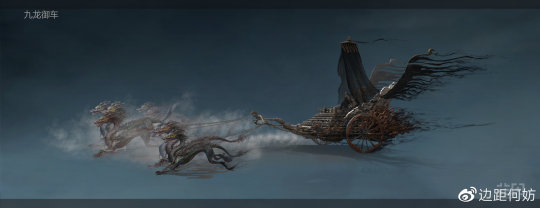
As for the image of Sangjiu, although it is a clam in terms of species setting, in the script adaptation, her image and aesthetic characteristics actually come from the dragon girl and the jiaoren (mermaid like creature). In classical culture, the images of Dragon Girls are constantly changing. They are heterogeneous, lower than the gods of the water tribe. They once offered pearls to the gods and were enlightened by the gods. They initially had the wildness of animals, and gradually evolved with the creation of classical literature to become beautiful, smart, and passionate.
Sang Jiu is exactly such an image. She is innocent and sentimental, but also has the vigilance of a small animal. She is not only a soft princess who holds her face up to the God of War, but also a vigorous girl with a longbow on her back and kills magic soldiers. During the days and nights when she married, like a jiaoren weeping pearl tears, she gathers them every night, tasting the bitterness of love.
The prop "mirror of the past" in the novel is adapted into the eyes of the god Jize in the script. The transformation of gods into things after death is one of the traditions of Chinese mythology. Just like those myths we have been familiar with since childhood, after Pangu died, his left eye was the sun and his right eye was the moon. Kuafu chased the sun and died, and his walking stick fell to the ground and turned into a peach forest. The ancients believed that when a tiger died, its eyes fell to the ground and turned into amber (tiger soul). When the divine body fell, Jize's gentle gaze turned into a divine mirror, illuminating the last hope with his spirit.
After all the creatures in the Mo River were slaughtered, Sang Jiu pulled out the water suppressing stone in the center of the river in extreme grief and indignation. "The water town stone, which is extremely heavy, rises from the bottom of the river. For a moment, the mud and sand in the river rolled, and the sand flew away." Sang Jiu turned the water suppressing stone into a sharp sword, killing Shangqing God Realm. It is remade into the (ocean god's needle, another name for Sun Wukong's golden cudgel).
Another example is the Tianzhu (Celestial Pillar) supporting the heaven and the earth, which is actually a complex of images such as Buzhou Mountain and wood. The script does not directly copy their names, but everyone will naturally think that this is the power of convention. The Spring Water Throwing Festival draws on traditional elements such as Nuo Opera and Tournament of the Gods.
2. Composition of the World: Human World, God Realm and Immortal Gate
The story of Changyue Jinming spans three distinct sections: the human world, the divine world, and the immortal's realm. Simply running the map will obviously split the story, so geography and time are used to weave them together in the adaptation of the script.
Geographically, the gods once lived around the Tianzhu, but now it is in ruins. The fairy gate is located in the human world, and practitioners have close contacts with ordinary people.
(1) The world of mortals
What is the human world like?
First of all, in terms of setting, it has a "king" and no "emperor". It must be set before the Qin Dynasty. The kingdom is divided, but the hearts of the people still yearn for unity. But it didn't land in any real dynasty or country, which is the inevitable result of fictional dramas. Secondly, its atmosphere and details must be separated from real life. It must have an ancient style and a floating mythological flavor. Therefore, the world view of the world is taken from a fictional classical myth:
In this world, there are demons, warlocks, magic weapons, and tyrants. There are princes and grandsons who practiced down the mountain, there are blood boiled in a cauldron, and there are prophecies about the return of destiny. There are immortals who fall into the mortal world and wander around the world, and there are magic weapons who leave the faction to help in the battle. The generals use immortal methods to fight against each other. In this world, the reference is the world view of "Investiture of the Gods" that everyone is familiar with.
The role of Pang Yizhi borrows some of Jiang Ziya's symbolic characteristics. They are all uncles who were driven down the mountain to do tasks. Jiang Ziya is confused about life in the world, and Pang Yizhi is also unreliable and cute. They are proficient in divination and bear a destiny that they don't know. Jiang Ziya was not destined for immortality, and in the end, Pang Yizhi also went to a similar fate.
Among the many characters who abandoned business and invested Zhou in the Romance of the Gods, Huang Feihu is the one who is most similar to Ye Qingyu. They are all relatives of the king, the town country and the Zhu country. Both have a father who is a veteran of the town. In the end, he was forced to have no choice but to defect to his former enemy with his family.
The contrast in the Romance of the Gods is the two princes Yin Jiao and Yin Hong. They once entered the mountain gate to practice, received advice, and obtained magic weapons, but they chose to be loyal to their father, King Zhou, and eventually died. Although Fengshen Yanyi has a critical attitude towards the second son, the script wants to use a more neutral attitude to praise and regret Xiao Lin's life choices. Camellia fell to the ground and fell into the mud, how can one not regret it?
In this world, the atmosphere of myth is like a shadow, just like the song sung by the crow and the news from afar that it relays. The smoke from the witch doctor's burning enveloped the palace, and the shadow of the demon lingered in the market.
In the capitals of Jing and Sheng, huge wreckage can be seen faintly in the distance. In the garden of King Jing’s Palace, there is a closer piece that was tied to a swing. The fragments that fell into the world, the traces of gods are everywhere. I saw some netizens asking what it is, but it doesn’t matter if you can’t see what it is. This weird spectacle itself has formed the atmosphere of this world and isolated it from the real history.
(2) The place of the gods
The fragments of Tianzhu are the hardware connection between the human world and the god world, and the dream of Prajna (aka Bo're) Floating Life is the software connection between the current human world and the god world ten thousand years ago.
The Prajna Floating Life narrated in the novel has only five episodes in the script, and it has to be divided into two parts with clear boundaries: the part of the battle between gods and demons, which bears a large amount of information and logic chains serving the whole play, Ming Ye's love story with Sangjiu has to be compressed into another part and cannot be unfolded, so the script is treated as a three-act drama structure, making it present the style of a short fable, and acting for the four audiences who enter the play.
The flavor of this ephemeral world, on the one hand, is composed of countless light and small fragments, such as the Qingluan (Blue Luan bird) car, the flying dance, and the fairy fruit tree. On the other hand, it is supported by the god system.
In classical mythology, gods present different styles, for example, the familiar job-type gods that constitute the management system of heaven, such as the Jade Emperor, the Queen Mother, the Three Officials, the God of Wealth, and the Elder Moon. There are also natural gods, such as Jumang, the god of wood, Gonggong, the god of water, Zhurong, the god of fire, Wangshu, the god of the moon, and Xihe, the god of the sun. The adaptation of the script chose the latter system, utilized their cultural elements, and at the same time avoided the names of real myths, and constructed twelve gods for the ShengQing realm.
The reason for choosing the latter is that the style requires a more distinct sense of antiquity from the gods and a more primitive source of power. They have the existence form of matter, natural phenomenon, and matter movement. Except God of War. Compared with other gods, this special position changes faster. If you are a god by battle, you will often die in battle. In terms of seniority, Ming Ye, who came to Shangqing alone from the East China Sea and was ordered in danger, is still a young junior in the eyes of his colleagues, but the duty is that the God of War must charge forward and die. The twelve gods finally died. They came from nature, and returned to nature. Gods are supposed to be ruthless, but when they sacrifice, they are compassionate. It is indescribable that a ruthless god, who was supposed to live the same life as the heaven and earth, died for the short-lived sentient beings.
As for the setting of the demon god, the adaptation of the script liberates it from the framework of "a villain". It has no ambition, no desire, no likes and dislikes, no sorrow and joy, and it is not even a living body, but some kind of energy, or universal law. If all living beings in the three realms are immortal, there will be endless sorrow, resentment and anger. The accumulation of misery for hundreds of millions of living beings will take the form of demons and gods, which is irreversible. It's like a sick body with malignant sores, bright and festering. Even if the bones are scraped and dug away, it will only remove the incarnation of the appearance. The Demon God is like an invisible cloud, always floating over the world, and no one knows whether it will appear next time ten thousand years later or tomorrow.
In the battle of gods and demons, in order to avoid fighting all over the world without any support, the script delimits the battlefield in front of the Tianzhu. At this moment, the whole world is embodied as this huge divine pillar behind him. If the pillar exists, the world will be safe, and if the pillar falls, the world will be destroyed. The furious demon god showed his wrathful appearance, like (the myth of) Gonggong crashing into Buzhou Mountain and smashing the Tianzhu. The god perishes, turns into a war halberd, and supports the world again.
After the fall of the gods, in fact, an era has come to an irretrievable end, and even if Ming Ye is alive, he is powerless to change it. The essence of the contradiction between Teng Snake-Tianhuan and Ming Ye-Sangjiu is the reshuffle of power after the Great War. When the era of gods came to an end, the aristocratic forces Teng Snake immediately launched a counterattack. (?)
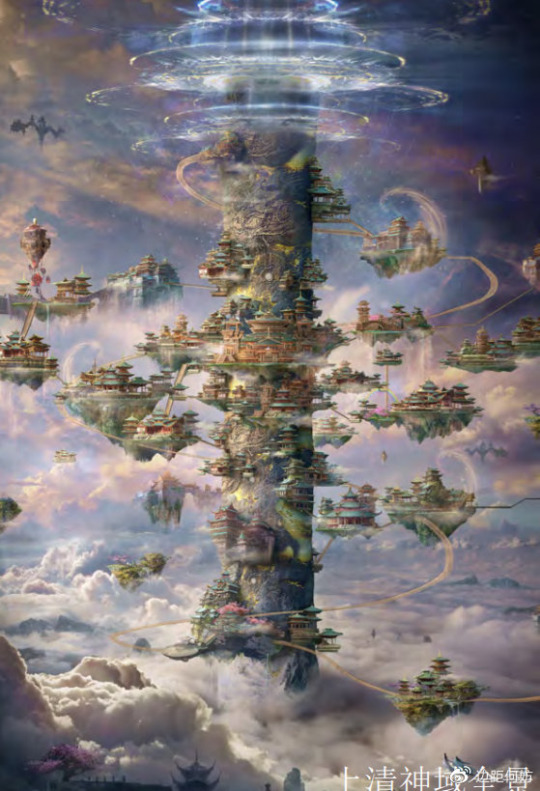
(3) Between man and God
After the Great War between the gods and demons, the collapsed pillars of heaven scattered across the world, becoming spiritual veins everywhere, and mortals gathered to practice, and fairy gates gradually emerged. The gate of immortality is outside the world of mortals, and the cultivators themselves come from the world. They are both troubled by the seven emotions and six desires, birth, old age, sickness and death, and they also have the method of detachment. Trekking from the mortal world to the immortal road is for practice.
Hengyang Sect and Xiaoyao Sect are the two sects where the protagonist belongs. In the adaptation of the script, Hengyangzong was endowed with some Mohist spirit. They have strict discipline, and they practice hard in the sect; they pay attention to the hardships of the world, and their disciples take turns going down the mountain to exorcise evil spirits;
At the beginning of the story, the Xiaoyao Sect was in a hurry, and the Hengyang Sect went up to the head and down to Li Susu, the younger junior sister, to rush to the rescue. But when the demon god came to Hengyang Sect, knowing that the strength of the two sides was extremely different, the disciples of Hengyang Sect still lined up neatly, "The disciples of Hengyang Sect are guarding the Mingwu Hall today, the sect will not stop, and the barrier will not be broken!" Disciple's spiritual inheritance of "go through the water and die, never die".
The spirit of Zongmen and the teachings of Qu Xuanzi's love deeply influenced Li Susu, not only made her " virtuous", upright and bright, and always insisted on kindness, but also made her persevere like iron and never give up an inch, even if her heart was broken and her body was crushed. Broken Soul also has to complete the task. Even in the deepest darkness, in the most painful despair, when all previous efforts have been abandoned and the heart is ashamed, I still choose responsibility.
The Xiaoyao School, on the other hand, infused more of Zhuangzi's spirit, and the whole school set the goal of being free and contented in life. When Hengyang Sect disciples study by themselves from five to nine, they are doing BBQ; when Hengyang Sect disciples are doing tasks, they are fighting Demon God Killer; They are all waiting for the occasional sun to come out and quickly dry the quilt and pants.
Cang Jiumin, who was blinded by happy education, finally got rid of the heavy shackles that could not be worn away by five hundred years of nether water, "Forget about things outside, and forget about yourself inside". He walked forward under the trust and protection of Master, and the clock stopped in his heart and finally started to turn again. Saving people with the God-killing Crossbow was a rehearsal of self-reflection, and after refining the Huxin Lin, Tantai Jin completely reconciled with himself, "Today I know that I am me", from a single thought of a god and a devil to a body of a god and a devil. Since then, all the coercion and temptation of monsters and the lobbying of ancient demon gods have lost their magical power. The fate of the world has thus changed.
Xiaoyaozong is shrouded in clouds and mists all year round, and the sun is not visible, but the junior brother Cang Jiumin is here to push through the clouds and mists, and suddenly see the light. Zhuangzi's " Heaven, earth and I were born side by side, and all things are one with me" is the state of the gods in the play.
3. Fate and Breaking Fate
The three magic weapons that appeared in the original work: Mirror of the Past, Qingshihua倾世花 (World overturning flower/jade), and Huxinlin护心麟 (dragonheart shield), their names are kept in the script, but their origin and function have been adapted. They constitute three intertwined long and short lines, connecting the past, present and future destiny.
In the catastrophe of annihilation, Li Susu was brought back five hundred years ago by the mirror of the past. She struggled to find Jize and witnessed the moment when Jize fell and transformed into the mirror of the past. Fate drew a circle at this moment, she found him, witnessed his death, and his death sent her to him.
Sang Jiu is enchanted, and the Tu Jin Teng Snake Clan refines the world-famous jade. Tantai Jin chose it because of the despair of quenching thirst by drinking poison, while Li Susu replaced it because of her unrelenting protection, and the inevitable fate of death will connect the two closely, just like Ming Ye and Sang who engraved each other with regret in Prajna Floating Life liquor. In the end, Li Susu turned the world-overturning jade, which was originally an evil thing, into divine marrow, and replaced Tantai Jin's evil bone with it.
And Hu Xinlin, originally from Ming Ye's heart to save the world, shaped the Buzhao Mountain full of fairy spirit, gave birth to the Xiaoyao Sect, and was brought to the world by Pang Yizhi, a disciple of the Xiaoyao Sect. After changing hands several times, he was finally rescued on the wedding night. They killed Tantai Jin, let him come to Xiaoyaozong alive, and reshaped Hu Xinlin.
Behind the three artifacts are the eyes of Ming Ye, Sang Jiu, and Jize who have been watching silently through thousands of years.
In addition to magic weapons and artifacts, the script runs through a large number of prophetic plots, either solemnly revealed, or unintentionally joked, and finally confirmed one by one in fate. The sense of fate is creepy, but the adaptation of the play spends effort to create this sense of fate, not to promote fatalism, but just the opposite. The Three Realms are boundless, all living beings are insignificant, and a tragic fate looms before your eyes, even the gods who know everything cannot be shaken. The more indestructible and unpredictable fate is, the more shocking it will be to violate it and break it.
The old Clam King told little Sangjiu a short story about saving pigeons by cutting their flesh. It is intense, bloody and pure, just like the fate of the characters in the play. No one knows how much it will cost to get back a little pigeon. When the dove flies lightly with destiny, the scale of life and death rises, hypocrisy does not exist, only piety remains, cowardice dissipates, only bravery, hypocrisy is annihilated, holiness appears, and everything in the world is mirrored before.
Sang Jiu exhausted all her flesh and blood, and finally lost her soul, regretting for thousands of years. Mingye exhausted his cultivation base and lifespan, and his spirit disappeared into pieces and turned into dust and smoke. Then, the pigeon fluttered out of Prajna Floating Life and flew towards Li Susu and Tantai Jin.
In the first half of his life, Tantai Jin desperately wanted to live. His "living" was a life that even the bottom of Maslow's pyramid could not have. He had nothing but pain. For such a miserable life, death was a complete relief, and he almost relied on animal instinct to struggle and refuse. However, from the perspective of the audience, it can be clearly seen that his body and mind have reached their limits, like a person who has already stood on the edge of the roof, and a gust of wind can blow him down the abyss.
Then Li Susu came and pulled him back from the brink, again and again. If she was cowardly, she would not have come here at all; if she was partial, Tantai Jin would have been abandoned from the very beginning. If she has justice but no kindness, if she has kindness but no justice, the mission will fail.
It's like a small game where there are many options to break through. Even the gods don't know how many questions are left, where is the correct answer, can't be skipped, there is no shortcut, and the game over is a wrong step. Li Susu has no strategies or spoilers. Her conscience prevents her from attacking the innocent Tantai Jin, and her responsibility forces her to carry out the plan to the end. She can only stumble and fear in the dilemma of justice and righteousness. Dragging the little devil forward. Keep going forward, even if you are desperate, even if you are happy, even if you are completely desperate.
Until the end of the chapter on the human world, she was just the little girl who ventured into the world alone, the youngest junior sister of the Hengyang Sect. The Goddess bloodline did not give her supernatural strength, racial advantages, or even the golden fingers that all the protagonists have, but only gave her an extremely difficult road and a painful fate. And all of this, no matter it was five hundred years ago or five hundred years later, she must keep her mouth shut. Five hundred years ago, she had no one to talk to. When she returned to the fairy gate, it seemed as if she woke up from a dream. Li Susu, a disciple of the fairy gate, was no longer an innocent girl. Secretly, to bear the pain of heartburn alone.
In Susu's chest, there is a heart of iron stone that is always optimistic. This iron stone is both an epee and a strong shield, protecting the sweetheart but must kill him. Until the final chapter, when the God-slaying Crossbow was aimed at the fairy gate again, she couldn't forget her love for Tantai Jin, struggling and hesitantly unable to ascend. And after becoming a god in Nirvana, knowing everything, and communicating with his lover, there is only one way to go before him, which is to become an accomplice of his lover's suicide.
If everything is given, will the gods turn back?
Tantai Jin in the human world chapter may be the person who is farthest from the gods in this world. At least Susu knew where the direction was, while Tantai Jin didn't know anything.
He didn't know why he killed his mother, why he made others fear him, why he couldn't catch it all, and dissipated in his hands when he caught it. He didn't know that his tears would turn into bullets that shot him, and he didn't even understand what it was when the nail hit. The greater pain was that he knew all about it later. Li Susu's love is a thread that pulls him up from the mud and makes him fall back, carries him through the sea of suffering and traps both of them. When he first came to this world, Tantai Jin was like a chess piece. Above the clouds that he could not know and touch, there was a giant hand of the game of gods and demons hidden, but when this chess piece miraculously broke free from the chessboard and fell to pieces... Afterwards, Tantai Jin became the chess player. He possessed the power enough to manipulate the fate of the world, and calmly chose the ending for himself and for the four continents and three realms.
For Tantai Jin, the world is a dark swamp with no roads, it is easy to turn into a demon, but he didn't. He tried his best to fight against his DNA, trying to climb out of bad luck, and finally found that he was bad luck itself, and he had to give up his flesh and blood.
When Tantai Jin and Li Susu realized this, the pigeons flew over. Giving up flesh and blood is not madness, but supreme mercy. This game of the brave cannot be passed without being pure and sincere. Tantai Jin and Li Susu are each other's white doves, and countless living beings in the three worlds and four continents are all carried on the feathers of the doves.
So the little pigeon decided to smash the indestructible destiny.
Four, and the last few sentences
If Changyue Jinming is disassembled, what kind of script is it?
It consists of three main lines: the mission of the heroine, the growth of the hero, and the game between gods and demons. The former two are intertwined with each other, and the latter emerges gradually, and finally climbs up the stairs with the audience, overlooking the Three Realms and looking back at the floating life.
It is composed of many imperfect characters: in the rules of idol drama creation, soft and flawless characters are safer and more popular, but multi-faceted characters belong to this story and live up to the due drama space. These facets are bright and dark, each mirroring other aspects of the character himself as well as other characters.
Each of its episodes consists of 15-20 small plot points and 2-4 events. Every 2 episodes there is a fluctuation in plot, emotion or character relationship, and every 5 episodes will cross a stage, which is oversaturated The plot may break due to information loss in subsequent productions, but it is enough to guarantee roller coaster ups and downs.
It does not say that love can save everything. In the whole story, love is the most fragile thing that is always abandoned, but it is precious because of its fragility and immortal because of its ephemerality.
It is not about the victory of gods defeating demons, nor the victory of a certain protagonist. It is about many people who sacrificed their lives, devoted their wisdom, and devoted themselves to it regardless of the outcome. In the end, the river was diverted and the fate of the world changed.
It is a work with many shortcomings and many regrets. From scratch, all participants have tried their best, worked hard, and taken risks, and perhaps left a little "different".
Writing scripts is a very lonely job. Most of the time, hard work does not mean rewarding, but film and television creation as a whole is like a relay race. The author of the original author hands the first baton to the screenwriter. The baton was handed over to the director, actors, art, costumes... After finishing, the baton was handed over to editing, special effects, and post-production. Every great creation is equally important. Everyone handed over the club with all their energy, and ran forward exhausted, competing for the final tacit understanding and unpredictable luck. And this last stick is given to the audience. I have always felt that audience discussions, judgments, and secondary creations are not feedback from film and television works, but a part of creation, the one that lasts the longest. In the script, there are also some deliberately vague plots left for the audience to characterize, such as the farewell between Sang Jiu and Tantai Jin.
Since Changyue started broadcasting, I have followed up the discussions and criticisms of each episode. It is a very precious opportunity to go back from the last stick to the beginning. I have learned a lot by reflecting on the script and looking for the crux.
It is a great honor to be able to participate in this creation with all of you.
25 notes
·
View notes